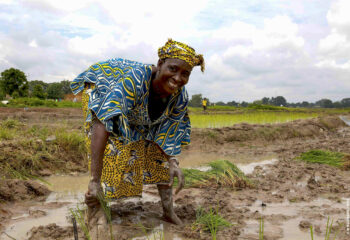September 12, 2012 – MUSCLE SHOALS, Ala., USA – The U.S. Agency for International Development’s West Africa Fertilizer Program (USAID WAFP) seeks to significantly increase food security and reduce poverty and hunger in West Africa. The program will increase the regional availability and use of appropriate and affordable fertilizers through: increased regional supply and distribution of fertilizers by the private sector; increased knowledge and use of agricultural technologies and methods; improved efficiency of regional market transactions; and an improved enabling environment for fertilizer policy and regulatory framework development. Currently, fertilizer consumption in West Africa is the lowest in the world and the fertilizer distribution chain is hampered by a wide array of constraints.
This five-year program being implemented by the International Fertilizer Development Center (IFDC) will have an impact across the Economic Community of West African States (ECOWAS) region; however, country-specific interventions will target the USAID Feed the Future focus countries of Ghana, Liberia, Mali and Senegal.
“Agriculture is the main engine of economic growth in West Africa and roughly 65 percent of the population depends on agriculture as their principal livelihood,” stated Dr. Amit Roy, president and chief executive officer of IFDC. “The agriculture sector contributes 30-40 percent of the region’s gross domestic product and over 15 percent of regional export earnings. This sector is best positioned to generate sustained and rapid poverty reduction in Africa.”
However, sector growth requires substantial increases in agricultural productivity, along with expanded and sustained integration of smallholder farmers into pre- and post-harvest markets. USAID WAFP will help move smallholder farmers from subsistence to commercial agriculture – farming as a business. This will require adequate supplies of affordable fertilizers and seeds for farmers, as well as access to credit, storage facilities and technical advice. Increasing fertilizer use is a critical element in raising agricultural production and productivity and in realizing the potential of agribusiness opportunities.
IFDC will work closely with a sub-grantee, the African Fertilizer and Agribusiness Partnership (AFAP), to ease supply-side constraints and ensure a reliable, affordable fertilizer supply in West Africa. The principal operating mechanism for AFAP support will be agribusiness partnership contracts (APCs) under which eligible international, regional or local agribusinesses will agree to perform significant market development activities with local farmers and agribusinesses in exchange for AFAP assistance. This assistance may include management and technical advice, credit guarantees, matching grants (for demonstrations and other demand-creation activities) and in-kind investments.
Additional collaboration in the form of small grants will be developed with local private sector partners, non-governmental organizations and research agencies to ensure full implementation of all proposed activities and sustainable continuation. Across the program, staff members will work to protect the environment and promote gender equity.
In the four focus countries, specific value chain interventions will be implemented including: improvement of site- and crop-specific fertilizer recommendations; soil testing and mapping; fertilizer trial demonstrations; and capacity strengthening of agro-dealers. Program activities will target 1,600 agro-dealers, through whom an estimated 25,200 farm households will engage in the application of new agricultural technologies and management practices on 320 hectares of technology demonstration fields. Program staff will seek to increase participating farmers’ maize and rice yields by between 60 and 90 percent through the use of IFDC’s integrated soil fertility management and fertilizer deep placement technologies.
This will be accomplished by reducing the cost of fertilizer to increase its use by smallholder farmers, reducing the distance between the farm-gate and agro-dealers and increasing the use efficiency of fertilizers by accurately matching soil type and crop variety to recommended fertilizer types and quantities.
Due to program activities, the volume of fertilizers sold is expected to increase about 16 percent annually in the focus countries. Through an effective market information system (MIS), at least 1,200 participants in the fertilizer supply chain (agro-dealers, importers, blenders and wholesalers) will receive frequent fertilizer market updates to make better informed business decisions.
A key program goal is the establishment of a private-public sector West Africa Fertilizer Stakeholders’ Forum. It will bring together manufacturers, importers, distributors, agro-dealers, international fertilizer associations, bankers, representatives of farmers’ organizations, policy makers, donors and other public entities. The Forum will provide a consultative, technical and business development platform for private and public sector stakeholders to develop the commercial fertilizer supply system in West Africa and also act as an incubator for the formation of the West Africa Fertilizer Trade Association.
Another program goal is the establishment and monitoring of quality standards to decrease the volume of adulterated fertilizer products. To help prevent adulteration, the program will support ECOWAS efforts to improve fertilizer packaging and labeling so that farmers are provided with a menu of choices in terms of fertilizer formulations, package sizes and labels that provide traceability to point of origin.
New fertilizer importers will receive business management and technical training for more accurate forecasting of market demands and better linkages to global fertilizer markets through multinational suppliers and processors. This will result in an improved fertilizer MIS to monitor supply and demand changes. The USAID West Africa Fertilizer Program will also work to facilitate the establishment of blending facilities for nitrogen, phosphorus and potassium fertilizers as well as warehouses for fertilizer storage. Additionally, the project will facilitate access to a USAID-funded Development Credit Authority (DCA) for specific private sector investments that increase fertilizer supplies. The DCA will help leverage investments across the fertilizer supply chain, because liquidity is needed from the farm-level through agro-dealers, distributors, manufacturers and importers.
Also, studies will be conducted in close coordination with USAID and African institutions to determine the impact of subsidies in West Africa and to facilitate a dialogue with key Fertilizer Forum stakeholders in order to reach a consensus on action plans for revisions to existing fertilizer subsidy programs.
###
IFDC Contacts:
Dr. Kofi Debrah
kdebrah@ifdc.org
Venancious Tuor
vtuor@ifdc.org
USAID Contact:
Kathryn Begeal
kbegeal@usaid.gov




